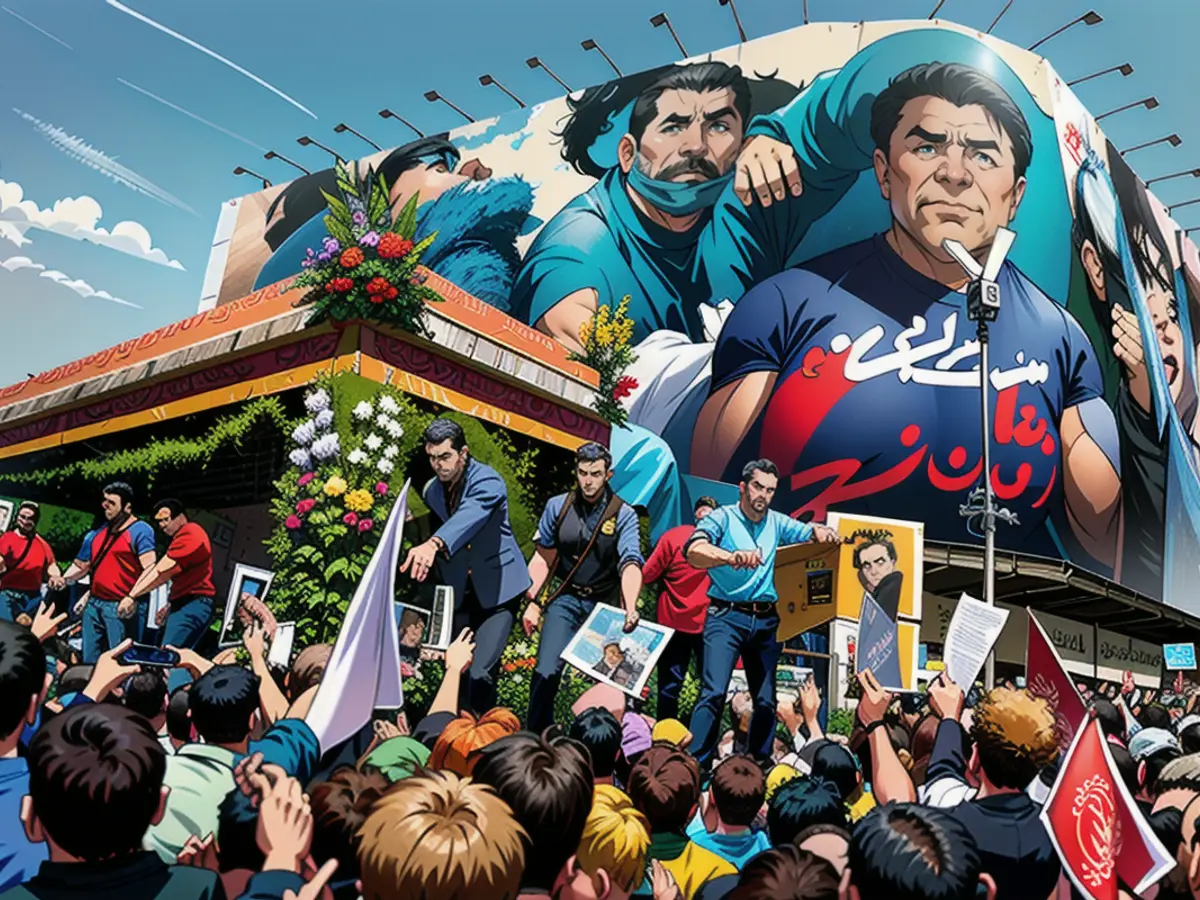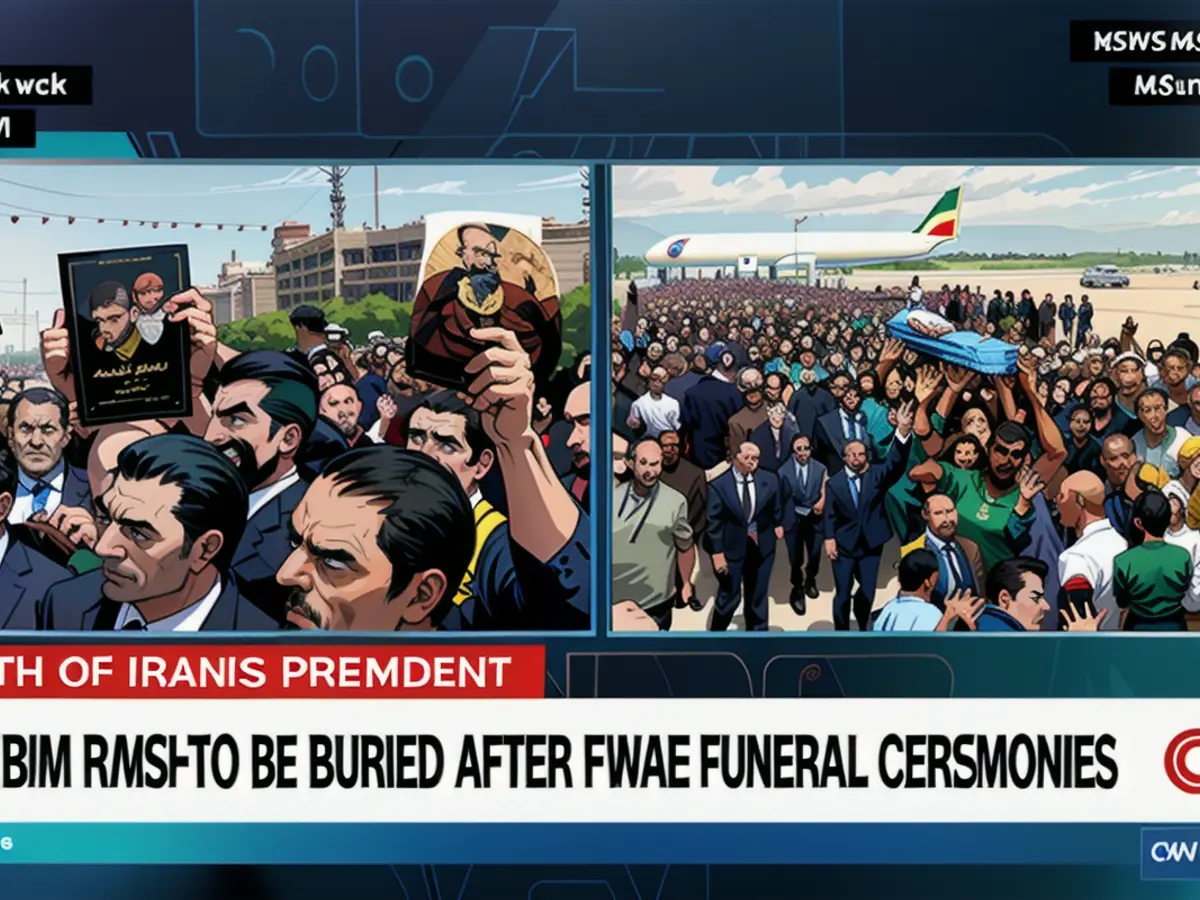Raisi's funeral involves more than just paying tribute to the late Iranian president.
Different from the past Iranian presidents, Raisi appeared content to just fulfill the conservative guidelines set by the Supreme Leader Ali Khamenei, who holds the ultimate control over policy decisions. He didn't give any resistance like his moderate predecessor, the cleric Hassan Rouhani, and didn't possess the charisma of previous presidents who performed tasks for Khamenei but still tried to gain independence in the president position, such as the outspoken Mahmoud Ahmadinejad.
Many foreign officials attended Raisi's funeral on Thursday, while they might not have been remembering him.
This death was not like the assassination of Iranian General Qassem Soleimani in 2020, who was credited with creating a stronghold in a major part of the Middle East for Iran and forcing the US to retreat.
Raisi's passing won't be missed. However, his sudden death comes during a crucial period in Iran's situation.
"This funeral is an opportunity for foreign dignitaries to get a sense of Iran's current status," said Trita Parsi, Iran analyst and executive vice president of the Quincy Institute, to CNN. "Many nations will show how their ties with Iran have changed."
Iran is involved in ongoing conflicts in the Gaza war, with Iran-backed groups engaging in an ongoing back-and-forth with Israel and its allies across multiple countries. In April, Iran launched an unprecedented direct strike on Israel from its own turf following an apparent Israeli airstrike in Tehran's consulate in Damascus.
Leaders from Turkey, India, and China – all of whom declared days of national mourning for the late president – seem determined to avoid angering anyone. The deaths also follow years of attempts to reach peace with former arch-enemies, such as Saudi Arabia and the United Arab Emirates, both of which were present at the funeral.
The Qatari emir and the foreign ministers of Saudi Arabia, the UAE, and Kuwait were in attendance, as was Hamas leader Ismail Haniyeh, who the International Criminal Court is seeking arrest warrants for alongside Israeli officials.
Thousands of people attended the funeral, throwing flowers on the coffins. It was a show of support for the government and a display of its broad support base. Iran's citizens are deeply divided, but the regime proved that it can still mobilize a significant number of people.
Iran no longer appears to be the internationally shunned country it was in 2018 when former President Donald Trump nearly turned it into a pariah state by pulling out of a major nuclear deal that exchanged sanctions relief for restrictions on Iran's nuclear program.
"This (funeral) is how nations can show progress in mending their relationship with Iran," said Parsi. "We've missed the change in how Iran's ties with its regional neighbors have progressed."
Foreign officials are likely holding secret discussions to try to decipher Khamenei's obscure and occasionally unpredictable thoughts on domestic policy, which could potentially impact the region.
The Iranian constitution demands a presidential election within 50 days of the death of a ruler. This is a relatively short timeframe to organize a race that could have implications for the succession planning of the ailing 85-year-old Khamenei, who is only the second Supreme Leader to govern the Islamic Republic. Moreover, the election could either assuage or intensify the tensions that have arisen from the nationwide youth-led uprising that shook the country less than two years ago.
Khamenei holds significant sway over elections via the country's Guardian Council, which is made up of judges appointed by the Supreme Leader and in charge of reviewing election nominees. In the 2021 presidential election, the council blocked many workable candidates, leaving only Raisi to effectively win the race. The event received a record low voter turnout.
The leader might organize a repeat of the election. Alternatively, he could opt for a change, allowing the next president to enjoy significant public backing.
"The election can be a pivotal event for Iran," Mohammad Ali Shabani, an Iran expert and editor of Amwaj.media, said on CNN's program with Becky Anderson. "He (Khamenei) has opened a path for the Islamic Republic to remain powerful by raising repression."
During his tenure, Raisi could only slightly challenge the notion of him as a pawn president. He was heavily criticized for being the puppet ruler who hollowed out Iran's existing institutions.
The Iranian legislative elections in March had a record low voter participation rate of 41%. The 2022 nationwide uprising marked the most significant domestic threat to the regime in decades. Since then, the divide between the regime and Iran's unhappy youth population has broadened.
"Khamenei has put the Islamic Republic on a track where it can only maintain power by increasing repression," said Parsi.
Opening the election could appease Iran's dissatisfied young population who are struggling with ongoing economic and political pressures. This could potentially lead to stabilizing the country's unrest. It might also help create a path for a more Western-like government, like the one led by Rouhani, who oversaw the groundbreaking 2015 nuclear deal while still working within Khamenei's limits.
However, experts believe this is simply wishful thinking.
"It's hard to see why Khamenei would alter his approach now," said Parsi. "He would have to admit that he's on a course that isn't beneficial, but the regime hasn't reached that conclusion yet."
"Given the succession of the Supreme Leadership, the regime wants to maintain the status quo. They'll pick a direction that keeps everything unchanged."

Read also:
- This will change in December
- Dikes withstand water masses so far - Scholz holds out the prospect of help
- Fireworks and parties ring in 2024 - turn of the year overshadowed by conflicts
- Attacks on ships in the Red Sea: shipping companies avoid important trade route
The Middle East and the world are closely watching Iran's response to Raisi's sudden death, given his country's involvement in regional conflicts.
Despite different approaches to policy decisions, past Iranian presidents and Raisi shared the common thread of attending international funerals, demonstrating Iran's global presence.
Source: edition.cnn.com







